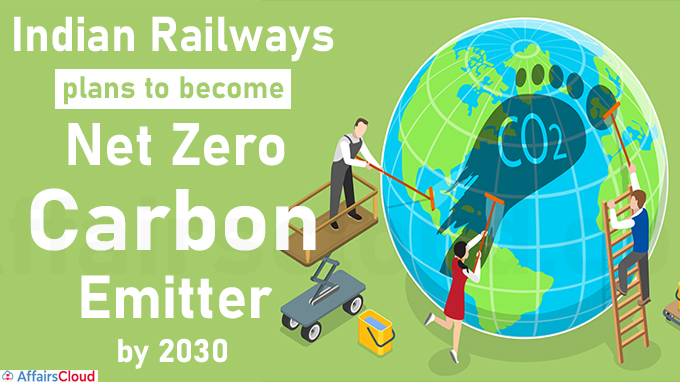 The Indian Railways (IR) intends to gradually reduce its carbon footprint and become a ‘Net Zero Carbon Emitter by 2030’ by completing electrification of all railway tracks and focusing on boosting network capacity.
The Indian Railways (IR) intends to gradually reduce its carbon footprint and become a ‘Net Zero Carbon Emitter by 2030’ by completing electrification of all railway tracks and focusing on boosting network capacity.
- As part of its Nationally Determined Contributions (NDCs), the Government of India (GoI) has set a target of 33% reduction in emissions intensity, with transportation as one of the important sectors with considerable mitigation potential.
Contribution of Indian Railways to India’s NDC for Tackling Climate Change
i.To increase share of IR in overall land-based freight transport from 36% to 45% by 2030.
ii.The IR is establishing Dedicated Freight Corridors (DFCs) across India, with the first phase of the project expected to reduce carbon-di-oxide (CO2) emissions by 457 million ton over a 30-year period.
iii.Perform, Achieve, and Trade (PAT) scheme will be implemented in the railway sector.
iv.Use of a 5% biofuel blend in traction diesel fuel.
v.Enhance water efficiency by 20% by 2030; tree plantation to increase carbon sink; waste management and pollution control; green buildings and participation in the “Swachh Bharat Mission”.
vi.Measures taken by IR in terms of environmental management: Energy Efficiency Management, Renewable and Alternate Sources of Energy, Water Conservation, Afforestation, Water Management, and Green Certification.
Reforms Undertaken by Indian Railways Since 2014
Net-Zero Carbon Emission
i.With a goal of becoming a Net Zero Carbon Emitter by 2030, the IR will minimize its carbon footprint primarily by getting its energy needs from renewable sources.
- The expected need for the installation of renewable capacity would be around 30 gigawatts (GW) by 2029–2030.
ii.As of August 2022, IR has deployed 142 megawatt (MW) of rooftop solar capacity and 103.4 MW of wind energy.
iii.Of the total 65,141 route kilometres (RKM) (80.61%) of the Broad Gauge (BG) network, 52,508 RKM have been electrified.
Water Policy 2017 For Effective Water Management
The Water Policy 2017 has been issued to all Zonal Railways and Production Units for implementation at Railway Stations, Trains, Railway Colonies, etc.
- As part of the NDC, the GoI is making efforts to reduce water consumption by 20% by 2020.
Objective: to increase water use efficiency through better demand & supply management; installation of water-efficient systems and establishment of water recycling facilities on railway land.
Environment Friendly Bio–Toilets for Passenger Coaches
IR has collaborated with the Defence Research & Development Organization (DRDO) to develop eco-friendly bio-toilets for passenger coaches.
- In accordance with the “Swachh Bharat Mission,” direct disposal of human waste from trains has thus been eliminated.
Third party Audit/Survey including Passenger feedback on Cleanliness
The ‘Third-Party Audit Cum Survey’ on major station cleanliness began in 2016 and was conducted in 2017, 2018, and 2019. The surveys offer unbiased evaluation and foster healthy competition in order to improve hygiene in passenger interface areas.
- In 2018, the first-ever cumulative third-party audit survey on the cleanliness of important trains was performed.
Other Initiatives
i.Since 2017, IR has planted around 1 crore trees annually, with a total of 72 lakh saplings planted in 2021 – 2022.
ii.Around 700 Railway Stations have received ISO: 14001 certifications for the Environment Management System.
iii.More than 545 stations have received Consent to Operate (CTO) from their respective State Pollution Control Boards.
iv.Green certification has been granted to 31 railway buildings (including offices, training institutes, hospitals, and schools), 32 stations, and 55 workshops/PUs.
Click here to read more about the other initiatives.
Recent Related News:
Rail Vikas Nigam Limited (RVNL), under the Ministry of Railways, signed a Memorandum of Understanding (MoU) with Bharat Heavy Electricals Limited (BHEL), under the Ministry of Heavy Industries, Industries, to make components and equipment manufacturing, infrastructure development and project execution indigenous.
About Ministry of Railways:
Minister of Railways – Ashwini Vaishnaw (Constituency – Rajya Sabha, Odisha)
Minister of State (MoS) – Raosaheb Patil Danve; Darshana Jardosh




